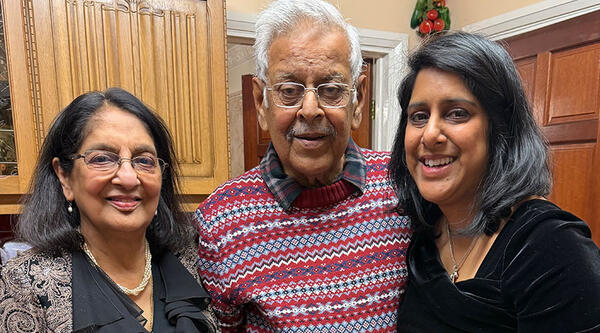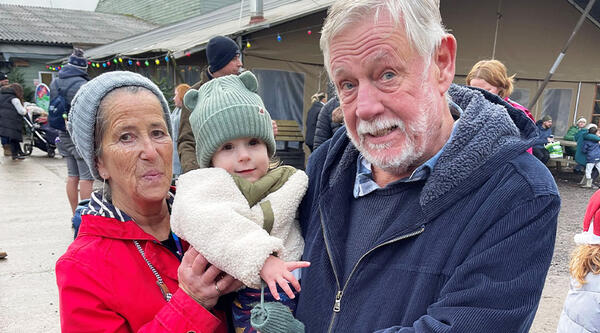Conflict of interest policy
Find out more about out Grant Advisory Board (GAB) and Expert Review Panel (ECP) conflict of interest policy.
Our Commitment
At Alzheimer’s Society, we’re committed to being transparent and fair when it comes to research funding decisions.
It is important that everyone involved in our research funding processes acts independently and avoids situations where personal or academic interests could influence any recommendation made to the Society.
To ensure our processes remain fair for all applicants, we have a Conflict of Interest (COI) policy to protect the integrity of our research funding processes.
This policy supports the work of our Grant Advisory Board (GAB) members, external reviewers, and all other participants in our research funding calls expert review processes, ensuring we maintain the highest standards of integrity and transparency.
Declaring a Conflict of Interest
If a conflict of interest is identified, please let the Research Grants team know as quickly as possible. Conflicts of interest must be reported to the Society as soon as they are identified by a potential reviewer to enable the team to act on that conflict and assign a new, unconflicted reviewer.
Wherever possible, conflicts of interest must be reported in advance of any meeting where expert review discussions will take place. This enables the Research Grants team to adjust the agenda for that meeting accordingly. However, in the event that a conflict is identified on the day of a meeting, please report the conflict as quickly as possible to the meeting Chair and Research Grants team so that appropriate action can be taken.
If you have any questions or require further clarification regarding a potential conflict of interest, please contact the Research Grants Team at [email protected].
Managing Conflicts of Interest
An expert reviewer or GAB member who has a conflict of interest with an application cannot provide written review or take part in subsequent discussion and scoring of that application at any stage during the expert review process.
Reviewers and GAB members with a conflict of interest will be removed from all discussions pertaining to the conflicted application. In virtual meetings, conflicted expert reviewers and GAB members will be placed in a virtual waiting room during the discussion of that application, returning to the meeting once the discussion has moved on to the next, non-conflicted application. For in-person meetings, expert reviewers and GAB members will be asked to physically leave the room whilst the conflicted application is discussed. In both instances, the minutes and agenda of the meeting will clearly state who has left the discussion due to a conflict of interest.
GAB members who have applied to Alzheimer’s Society for funding cannot be involved at any stage in the review of their own application. They also cannot review any application of the same grant type as their own application during that same grant round. For example, a GAB member who has submitted an application for a project grant cannot review any other project grant application submitted within the same grant round.
The GAB Chair cannot apply for funding from Alzheimer’s Society’s annual response mode grant round (which the GAB oversees) during their term as Chair. This includes being a lead applicant or co-applicant. The GAB Chair may apply for funding from Alzheimer’s Society research funding calls which are reviewed by a separate Advisory Board.
Applicants within a response mode grant round should not serve as expert reviewers for other applications within that same grant round.
Guidelines for Board Members and Expert Reviewers
Expert reviewers and GAB members should consider the following as conflicts of interest:
They have supervised a student, fellow, or applicant connected to the application in the last 3 years.
- E.g. If an expert reviewer has previously supervised a PhD student who is now applying for further funding, they must inform the Research Grants team as soon as possible, as this is considered a conflict of interest.
They have a close collaboration with the applicant.
- E.g. An expert reviewer who has worked with the applicant as a co-investigator on other research projects, served as a supervisor or a mentor, or collaborated with shared funding in the past 3 years cannot review that applicant’s application as this would be considered a conflict of interest. However, if the grant was part of a large consortium with many investigators and the reviewer had no direct or meaningful collaboration with the applicant, this may not be considered a conflict. In this instance, please discuss further with the Research Grants Team at [email protected].
They have co-authored or collaborated with the applicant in the last 3 years.
- E.g. An expert reviewer who has co-authored a paper with the applicant in the past three years cannot review an application from that applicant as this is considered a conflict of interest. However, if the paper was part of a large consortium with many authors and the reviewer had no direct or meaningful collaboration with the applicant, this may not be considered a conflict. In this instance, please discuss further with the Research Grants Team at [email protected].
If they work at the same institution as an applicant.
- E.g. An expert reviewer who works at the same institution as an applicant is considered to have an institutional conflict of interest. If you have any questions regarding an institutional conflict, please contact the Research Grants team to discuss further at [email protected].
For any questions about how this policy applies to your role as either an expert reviewer or GAB member, please contact the Research Grants team at [email protected].
Glossary & Useful Terms
- External – Refers to individuals, organisations, or factors outside of Alzheimer’s Society.
- Grant Advisory Board (GAB) – The panel of scientific and lay experts responsible for reviewing and making recommendations on funding applications in Alzheimer’s Society’s annual response mode funding round.
- GAB Member – An individual who serves on the Alzheimer’s Society’s Grant Advisory Board, contributing to funding recommendations and policy adherence.
- Expert Reviewer – A person with specialist knowledge who has been asked to review an application for research funding. This may include both academic and lay lived experience reviewers.
- Chair – The individual leading the Grant Advisory Board.
- Vice-Chair – The designated individual who steps in when the Chair has a conflict of interest.
Contact Information
For any concerns or clarifications regarding conflicts of interest, please contact the Research Grants Team at [email protected].








